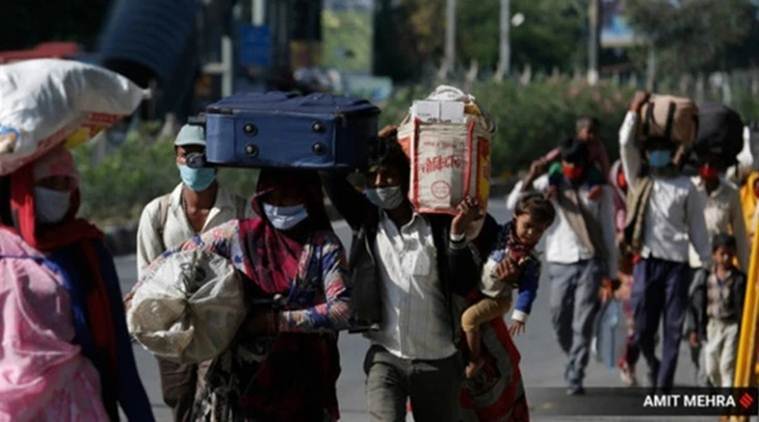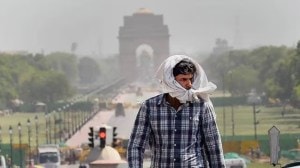- India
- International
States compete to bring in sweeping changes to labour laws, ‘competition to attract capital’, say analysts
A blanket suspension of labour laws, as has been in the case of UP, however, may not find favour, with the Centre leaning towards putting caveats in order to protect the rights of bonded labour, children and women.
 While states like MP have taken a more nuanced approach, UP and Gujarat have opted for a broader, more sweeping relaxation of the labour laws. (Express File Photo by Amit Mehra)
While states like MP have taken a more nuanced approach, UP and Gujarat have opted for a broader, more sweeping relaxation of the labour laws. (Express File Photo by Amit Mehra)
With at least 10 states moving to amend their labour laws ahead of restarting economic activities post the COVID-19 lockdown, an overhaul in the central labour laws is being seen in the offing. It is learnt that most states are expected to move towards extended working hours and are likely to follow the model of suspension of labour laws like Uttar Pradesh and Madhya Pradesh, with the Centre according to the requisite backing for the changes following which it will move towards an overhaul of central labour laws as well.
A blanket suspension of labour laws, as has been in the case of UP, however, may not find favour, with the Centre leaning towards putting caveats in order to protect the rights of bonded labour, children and women. While UP and MP have opted for a suspension of labour laws for 1,000 days, as many as ten states — including Rajasthan, Punjab, Odisha, Maharashtra, Himachal Pradesh, MP, Haryana, Assam and Gujarat — have allowed extension of working hours to 12 through issuance of orders under the Factories Act during the ongoing lockdown against the COVID-19 pandemic.
While states like MP have taken a more nuanced approach, other such as UP and Gujarat have opted for a broader, more sweeping relaxation of the labour laws, leaving drafting loopholes that could see potential legal challenges in the days ahead.
Madhya Pradesh has exempted employers from some obligations under various labour laws like Factories Act, Madhya Pradesh Industrial Relations Act and Industrial Disputes Act, and Contract Labour Act for a period of 1,000 days, i.e. nearly 3 years. This gives employers the freedom to hire and fire, and contractors not needing a licence to supply labour of up to 49 persons.
The state has also exempted new factories under the Factories Act, 1948 from inspection by the Labour Department and permitted the flexibility to conduct third party inspections at will. It has also issued an Ordinance to the Madhya Pradesh Labour Welfare Fund Act, 1982, exempting all newly established factories from filing annual returns and paying Rs 80 per labourer per year to the Madhya Pradesh Labour Welfare Board for the next 1,000 days.
Explained | What labour law changes by states mean

UP has given a 3-year exemption to all factories and establishments engaged in manufacturing from all labour laws, except provisions of Bonded Labour System (Abolition) Act and those relating to employment of children and women. The Ordinance has been sent by the state for the President’s assent, prior to which the Union Labour Ministry will also give its comments on the Ordinance.
On May 15, however, the UP government, in a communication to the Allahabad High Court following a notice for a public interest litigation, withdrew its earlier order regarding extension of daily working hours in industrial units to 12 hours from 8 hours.
ExplainSpeaking: Are Indian labour laws as inflexible (or pro-worker) as is often claimed?
Gujarat has also announced the intent to follow suit with a 1,200-day exemption of labour laws for new industrial units, with the state also having sent the Ordinance for the President’s approval following comments from the Union Labour Ministry.
While a section of experts is viewing these changes as a competition by states to attract capital after the lockdown, many see the blanket suspension of labour laws as a rushed move without details and leaving it ambiguous and open to litigation. “In Madhya Pradesh’s order, there is clarity as to which clauses would be applicable and clauses which won’t apply. Uttar Pradesh’s Ordinance mentions that provisions of Factories Act and Building and Other Construction Workers Act relating to safety and security of the workers shall remain applicable. Any provision can be safety or security related even if it’s related to lighting or temperature control at the unit. But details are missing. The order is ill-conceived, misplaced and lacks clarity,” said KR Shyam Sundar, labour economist and professor of Human Resources Management at XLRI.
Trade unions have opposed the changes being made in labour laws. Ten central trade unions — including Indian National Trade Union Congress (INTUC), All India Trade Union Congress (AITUC), Centre of Indian Trade Unions (CITU) — registered an initial complaint with the International Labour Organisation (ILO) on May 14, terming these moves as “an attack on human and labour rights”, asking for ILO’s intervention on “the extremely precarious and regressive moves” for the working class in the country. RSS-affiliated Bharatiya Mazdoor Sangh (BMS) has also instructed its state units to oppose the unilateral withdrawal of labour laws.
Former Labour Secretary Shankar Aggarwal said many labour laws are archaic and leave scope for harassment at the hands of labour inspectors or require multiple levels of approvals for those running manufacturing units. “Manufacturing units require no objection certificates from various departments. Bribes are taken by labour inspectors and violation of some of the provisions have imprisonment as punishment. These are exceptional circumstances, smaller units are already at the brink of closure due to a risk of shortage of inputs from China and lack of consumption demand. States should be allowed to move forward with their labour reforms,” he said.
Labour is a concurrent subject, with both the Centre and states having powers to enact laws. Where there is any conflict between a central law and a state law on the same subject, the central law is expected to prevail. If some of the laws that states have moved to suspend have a corresponding act in the central domain, the suspension is open to legal challenge.
Both the Centre and states have separate machinery to enforce the labour laws, including the Contract Labour (Regulation & Abolition) Act, 1970 and the corresponding Rules. The enforcement in the Central Sphere is done through the officers of the Central Industrial Relations Machinery (CIRM). The country-wide network of Deputy Chief Labour Commissioners (Central) under the Chief Labour Commissioner (Central) is mandated to settle the complaints/claims under rule 25(2)(v)(a)&(b).
The respective state governments are entrusted with implementing labour laws and undertaking inspections in the state sphere independently “for proper implementation of the Acts”.
Apr 26: Latest News
- 01
- 02
- 03
- 04
- 05









































